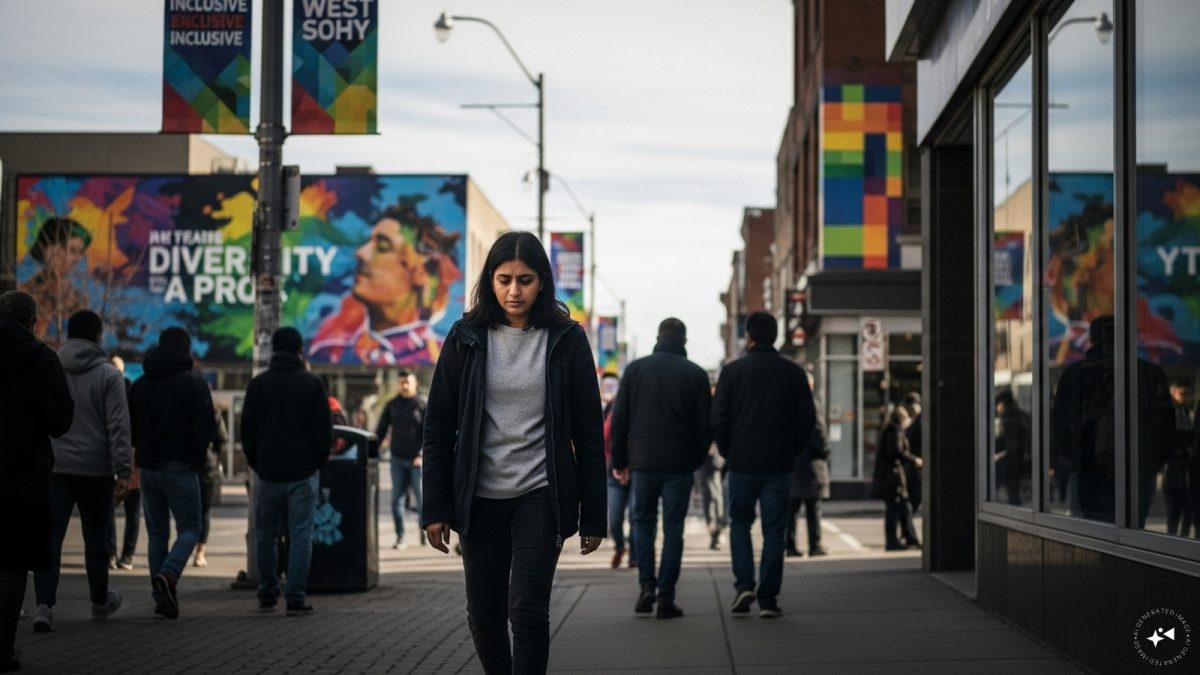A recent video that has gone viral in Canada and also in India shows a young white man hurling racist abuse at an Indian-origin worker in a McDonald’s outlet in Oakville, Ontario. The incident occurred on October 26, 2025. The man is seen shouting slurs and telling the employee to “Go back to your f….ng country, you stinky ass Indian.”
A woman who was filming the incident confronted the man, asking if he would work at the McDonald’s, to which he responded “no”. The man became aggressive towards the woman filming but continued with his racist tirade. Reports suggest this might not be an isolated incident, and that a group of teens has allegedly repeatedly targeted South Asian staff at the same location.
The video circulated rapidly on social media, sparking widespread outrage and debate about rising anti-immigrant sentiment and hate crimes in Canada. Other recent videos showing racist incidents in Canada have also gone viral, including an incident in August 2025 where Canadian youngsters harassed an Indian couple in a Peterborough parking lot.
Racism is a serious and pervasive problem in Canada, manifesting in systemic inequalities and individual acts of discrimination. Despite the country’s official commitment to multiculturalism, a significant portion of the population, particularly South Asians, Indigenous and Black people, experience racism regularly.
In a 2024 survey, 45 per cent of racialised Canadians reported experiencing racism or discrimination in the past five years, with 81 per cent of those reporting repeat incidents. Discrimination is commonly encountered in public places like stores, banks, and restaurants. During the Covid-19 pandemic, Asian Canadians reported increased verbal abuse and fear of public spaces.
Racialised individuals in Canada earn an average of 81 cents for every dollar earned by their non-racialised counterparts. Studies show employers are significantly more likely to interview candidates with English- or French-sounding names, despite identical qualifications.
Impact Shorts
More ShortsWhile Canada often prides itself on being an “inclusive society”, this perspective is often challenged by the real-life experiences of racialised individuals. The denial of racism’s existence is a part of the problem, making it harder to address the complex and often subtle or unconscious forms it takes. Police-reported hate crimes have shown a troubling and consistent increase over several years, with race or ethnicity being the most common motivation.
The number of incidents targeting the Black population and the South Asian population has risen significantly in recent years. The existence of racism in Canada is widely acknowledged by various institutions, including courts, human rights commissions, and the federal government. The Canadian Human Rights Commission has noted a tendency to deny the reality of racism, which can be counterproductive to addressing the issue effectively.
A 2025 analysis by the Institute for Strategic Dialogue documented a marked rise in anti-South Asian hate. In 2023, police recorded 4,777 hate-motivated incidents, a 32 per cent increase from the previous year. Between 2019 and 2023, police-reported hate crimes targeting South Asians increased by 227 per cent. Online hate speech, amplified by extremist groups and racist incidents—some of which have gone viral—is also fuelling this trend. Online extremist networks contribute to the amplification of racist narratives.
Rising housing costs and employment anxieties are scapegoated onto immigrant communities by extremist and anti-immigrant rhetoric, particularly targeting South Asian newcomers. Racism has been shown to erode civic trust, damage feelings of belonging, and negatively impact the perception of Canadian society’s fairness among racialised individuals.
Studies indicate that people who experience discrimination are less likely to have confidence in Canadian institutions like the police and courts. In short, racism in Canada is a deeply embedded, multi-faceted issue that has significant negative impacts on the daily lives and well-being of racialised and Indigenous communities.
The Canadian government has acknowledged that racism and discrimination are pervasive and continuing realities. In response to these trends, the federal government released Canada’s Anti-Racism Strategy 2024–2028. It is an action-oriented plan to address systemic racism within federal institutions and support communities.
Key elements include a focus on racial equity in areas like immigration, health, and housing; reforms to the justice, law enforcement, and public safety systems; and investments to fund community-led initiatives aimed at combating hate. It remains to be seen how successful the Canadian government will be in fighting the menace.
In conclusion, the challenges for South Asians facing racism in Canada involve addressing hate crimes and online bigotry while leveraging community resilience and government anti-racism strategies to foster a more inclusive society. The road ahead requires a collective effort from government, civil society, and communities to challenge anti-immigrant narratives, enforce anti-hate measures, and ensure that federal policies and public perception reflect an inclusive Canada.
(The writer is a retired Indian diplomat and had previously served as Ambassador in Kuwait and Morocco and as Consul General in New York. Views expressed in the above piece are personal and solely those of the author. They do not necessarily reflect Firstpost’s views.)


)

)
)
)
)
)
)
)
)



